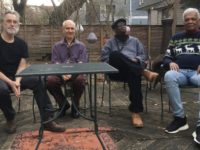Jazz began as Buddy Bolden’s ragtime inspired by former slaves performing in New Orleans’ Congo Square during the latter years of the nineteenth century. Somehow it ended up some seventy years later in a studio just off of New York’s Times Square. That’s when and where Albert Ayler and his trio recorded Spiritual Unity on one summer day in 1964.
A breakdown of how jazz went from the music of freed slaves to music freed from the shackles of timekeeping and rigid scales is a discussion best left for a another forum, but it was apparent that the maverick saxophonist Albert Ayler walked into that studio fifty years ago last week to bring jazz to the terminus point in its trajectory of development. Others would say he steered it way off track, and he remains a controversial figure decades after his 1970 death mainly because of the reaction to these recordings.
Regardless of what one thinks of 60s avant-garde jazz, this was the moment where it, in some respects, coalesced. Much of the reason for that is because in bassist Gary Peacock and drummer Sunny Murray, Ayler found a rhythm section that fully understood his impenetrable conception and made him complete by putting his ideas into sharp context. Peacock, whose bass is wisely mixed up front, undertakes an impossible task that befuddled Ayler bassists before him and completely masters it, setting the template (along with Charlie Haden) for free jazz bassists who would follow. He alternatively pushes against and pulls on Ayler, offering perfect counterpoint sequences of notes that make it appear that Ayler’s own note choices weren’t random. Murray transforms himself into a percussive extension of Ayler, using the leader’s ebb and flow and Peacock’s own deconstructions for cues, instead of beat placements. He, too, turned the application of his instrument upside-down.
“Ghosts,” broken up into two variations at the beginning and the end of the original album, begins with Ayler’s deceptively elementary sing-song theme (it’s curiously easy to imagine it being adapted as bumper music for a game show), and Ayler’s extreme emotionalism is a bit jarring if you’re not prepared for it. This, however, is where he reaches deep inside himself to find expressions that are primal and impulsive. His saxophone quivering sweetly on an alternate pitch like Lester Young on hallucinogens haunts listeners throughout “Spirits.” “The Wizard” doesn’t even bother with a defined theme that most ears can pick up; Ayler jumps right into the free form fray and amazingly, Murray and Peacock find the center.
The ‘expanded’ part of this Spiritual Unity reissue comes from the extra track tacked on to the end, “Vibrations.” This recording mysteriously stood in for the “Spirits” track on one early vinyl pressing of Unity under the “Spirits” name and has invariably appeared on other Ayler releases under other names, including the title cut for Vibrations; this version was recorded along with the original Spiritual Unity tracks. Now it’s back on the album that it originally — possibly accidentally — appeared on. “Vibrations” wasn’t any more primed for the Top 40 than the other performances, but the close assimilation and affinity of the group that made Spiritual Unity truly special is present on this track, too. It belongs here.
The first jazz record and second record overall released by the just-beginning ESP-Disk record company, Spiritual Unity quickly put this tiny label on the map, as well as thrust Ayler to the forefront of the free jazz movement when it was released more than a year later. Even then, this record was well ahead of the frontier of jazz. And still today, there’s not much out there that is truly “out there” as Spiritual Unity. There are scant few among those that possess its uncanny focus and unified purpose.
To go way forward in music, you have to go back fifty years.



